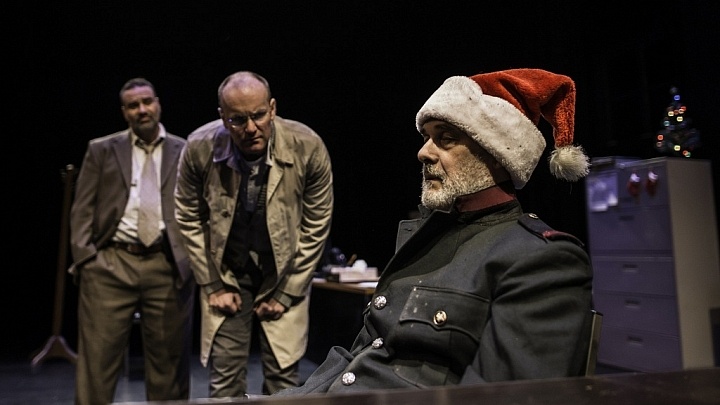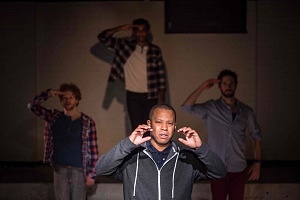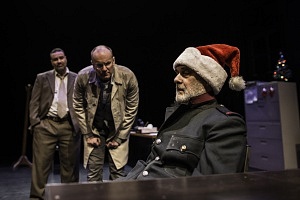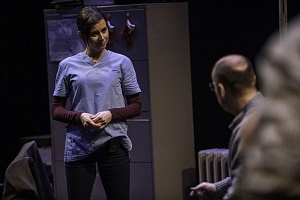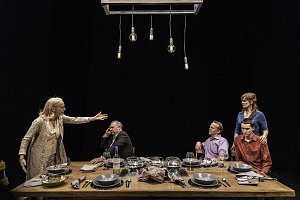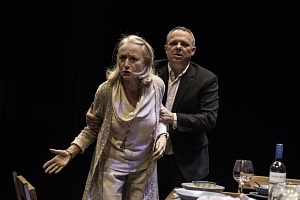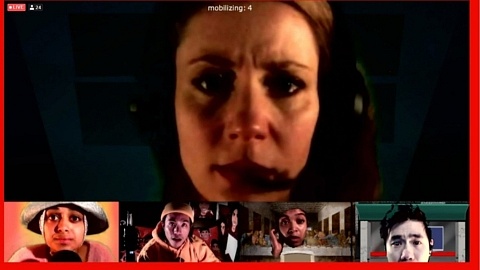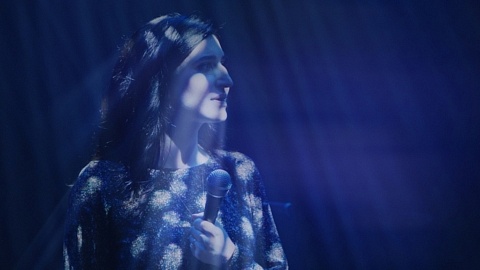Rick Roberts’ Orestes, directed by Richard Rose, confronts the progressively blurring lines between real life and virtual life in a heightened version of the...
November is the Cruellest Month: Three new plays at the Theatre Centre
The November Ticket: there’s something gloomily appropriate about the title the Theatre Centre has given its mini-season, co-presented with Why Not Theatre, surface/underground, and Butcher’s Block Collective. Seeing the season’s three plays is a thoroughly sobering experience, as chilly and raw as the skin on my face walking to and from the theatre. All three plays are written by young playwrights, two Canadian (Nicolas Billon and Jordan Tannahill) and one an American woman of colour (Jackie Sibblies Drury). It’s truly exciting to see that a season has been formulated around the work of these young artists.
While the productions may be connected in their intended sobering affect, however, they’re unfortunately not connected in quality: We Are Proud to Present a Presentation About the Herero of Namibia, Formerly Known as South West Africa, from the German Südwestafrika, Between the Years 1884 to 1915 by Drury is a disturbingly smart reflection on the insidious development of racist discourse, and Billon’s Butcher makes valiant motions towards a political interrogation of justice; Tannahill’s Late Company, on the other hand, is so bogged down in pseudo-profundity it’s almost unbearable.
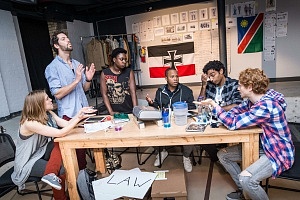
(From left) Darcy Gerhart, Brett Donahue, Khadijah Roberts-Abdullah, Marcel Stewart, Michael Ayres, and Brendan McMurtry-Howlett in We Are Proud to Present…. All photos by Dahlia Katz.
First up and my favourite of the season: We Are Proud to Present (etc.) in its Canadian premiere. Let Brooklyn-based Drury’s bafflingly long title be a loaded tip: this isn’t a production that can be easily summarised, contained, or made peace with. Actors meet the audience at the door, thanking them for coming and scrambling to find them seats. Other ensemble members mill about the space “warming up”; the whole thing feels disarmingly like the overture to a high school play and charmingly similar to previous and just as informal works by director Ravi Jain (the meet-and-greet style feels comfortingly similar to Jain’s semi-autobiographical A Brimful of Asha). There are a number of false starts, including a botched PowerPoint presentation on the history of Namibia and a fumbled overview of a pre-presentation presentation attempting to explain exactly what it is we’re all here to learn… and before I really knew it, the play was in full swing. It is at this point that the audience might begin to suspect that the theatrical event – the performance proper – has started before they even walked in. We Are Proud to Present is a frank look at not only how racism proliferates throughout European contact with Africa, but also how it proliferates throughout the creation of art itself – even art that attempts to combat dangerously racist discourse.
The cast of six – given bracingly on-the-nose names like Black Man (Marcel Stewart), White Man (Brett Donahue), and Black Woman (Khadijah Roberts-Abdullah) – travel through different spaces of performance (Namibia in the 1880’s, pre-Civil War America, the present day) with virtuosic ability. We Are Proud to Present goes to some profoundly racist places and sits there, stubbornly demanding that its audience see exactly how racialization occurs. What’s truly clever, and indeed politically charged, is how the play draws connecting lines between historical European colonialist projects, the transformation (and not the eradication) of racism in the US, and the typical structuring of theatrical projects in North America along racialized lines. Yes, the play is about the Heroro of Namibia and the attempted genocide of said group by German colonizers; but by the piece’s conclusion, where a noose swings back and forth threateningly in front of Black Man (Stewart) who is screaming that he “cannot breathe” (the last words, of course, of Eric Garner as he was choked to death by a New York police officer in July 2014) we have clearly moved into a realm beyond just the historical subjugation of black peoples.
We sit in strained silence, as the staged lynching in front of us conjures up images of a different kind of lynch mob, one equipped not only with guns but with badges. The deaths of Garner and Michael Brown, and of Toronto’s Sammy Yatim, haunt not only the stage but the theatre lobby and the dark and drizzly Queen Street outside. Drury gives us no tragic purgation of emotion after such a charged moment. Instead, the actors leave awkwardly one by one over what feels like an eternity. The fluorescent lights are shut off, leaving the audience alone in the dark without the luxury of knowing whether or not the play is truly over, of knowing whether or not the violence is truly over.
This uncertainty is profoundly upsetting – the play’s refusal to adhere to strict “on-off” theatrical conventions upsets the very idea that what has just occurred is anything other than a part of reality. By not flipping the switch on the theatrical event in any clear-cut way, We Are Proud to Present presents its audience with the possibility of being actors in the world, of being agents of change and upsetting power structures that would allow for such violence to continue.
In many ways, Butcher attempts a similar project to We Are Proud to Present. The execution and the outcome, though, are far different. A searing political commentary dressed up rather unflatteringly as a realist crime drama, Butcher is certainly powerful, but seems unsure of what to do with its strength. The wet blanket of realism suffocates what could be a gripping exploration of the relationship between revenge and justice, and ultimately muffles any real impact Butcher could have beyond the well-worn tropes of terrorism and tragedy.
Billon’s script is fascinating, disturbingly so. He has some serious points to make about war, terror, and the creation of extremism, which he does with precision through fast, sharp dialogue and intelligently drawn characters. An elderly man (played by John Koensgen) is found outside a police station with a butcher’s hook slung around his neck and a note saying “arrest me” in a foreign language. The language and the man both turn out to be from Lavinia, a vaguely Slavic country fabricated by Billon, the site of a genocidal civil war some 20 years earlier. What occurs after is enough to make any lover of Criminal Minds salivate – it’s gritty stuff, and doesn’t shy away from violently putting its money where its mouth is. Those in the first few rows of the theatre can attest to this.
Billon’s choice of referent is interesting; in many ways the Yugoslav wars (to which the play is doubtless referring) sounded the end of the 20th century, an era of unheard-of violence and militaristic innovation. War in the 21st century is rather different: global impact has superseded nation-to-nation (or nation-within-nation) engagement; consistent violence has overtaken localized skirmishes; and the act of killing itself has become even more depersonalized through the use of drones and other pilotless mass-murder machines. Perhaps Billon’s call back to this period of violent transition is an attempt to engage with the still-ongoing fallout of past violence, fallout which itself so readily becomes violent. Snipers over Sarajevo; bombs over Baghdad; drones over Damascus; in the cycle of violence the wounded oftentimes become the inflictors of wounds, and it is this chilling thought that lies at the heart of Billon’s piece.
While its message is important, Billon’s script is hindered by its unremitting drive towards realism, and Weyni Mengesha’s production plays into this — as with the hyper-detailed nature of Yannick Lariveé’s set. I was continuously drawn away from the action by questions like whether four or five of the filing boxes onstage were really necessary (spoiler: they weren’t). Moments of intensity – highlighted by clanging music, a surreal blue light, and drawn-out gestures – come off too obviously as attempts to assert theatricality and cut against the film/TV aesthetic.
That’s not to say the production misses its mark completely; an exceptional cast brings Billon’s harshly intelligent characters to life. Michelle Monteith as Elena, the nurse-translator-terrorist who holds the other members of the police station hostage, is particularly captivating. We learn that Elena is an internment camp survivor who has joined a radical terrorist group determined to find and kill all remaining Lavinian war criminals at large (one of whom is Josef Džibrilovo, the aforementioned elderly man). We are led to believe that Monteith’s character is more monstrous than a bona fide war criminal – and then to doubt this assessment, in one of the play’s characteristic twists and turns.
Elena calls herself an instrument, like the ever-present butcher’s hook itself, but she seems to me more like the not-quite-dead victim on the butcher’s killing room floor. She is decidedly cold, showing no pity to her hostages and deftly manipulating them at every turn. Yet she can’t be painted simply as a villain; her pain is too palpable for an audience to ignore. It is a privilege to watch Monteith bestride the line between wounded survivor and vengeful soldier, especially in the final moments of the play as her harsh, instrumental exterior crumbles.
Had play and production been less preoccupied with a realist portrayal of time and space, I would have been more inclined to invest in some of the stranger events that string the plot along (certain “This whole time?!” moments are painfully obvious well before their reveal). Billon made the point of making up a new country and a new national trauma, instead of situating his drama within existing events; but the creation of Lavinia and its war-torn people is a gesture of non-realism ultimately undone by script and set’s over-reliance on realism. A cast of consummate performers just isn’t enough to reconcile this theatrical dissonance.
We Are Proud to Present and Butcher, although vastly different, fall in step in their attempts to tackle the realities of violence, hatred, and justice. Perhaps Late Company, written by Governor General Award-winner Tannahill and directed by Peter Pasyk, attempts something similar, but I couldn’t get past the obvious writing and rather stunted delivery to find a nuanced interrogation of such themes. Late Company is about a meeting between the bereaved parents of a teenager who died by suicide and the family of a classmate who emotionally tormented him. It is, I’m sure, meant to be a raw portrayal of parental grief and rage, as well as an exploration of how homophobia is disseminated through the family unit. But Late Company is too full of one-dimensional characters and tweet-able truisms to make any real comment on the ideas it presents. What we are left with is the same, tame “It Gets Better” sentiments that the script ostensibly attempts to critique.
Let’s take a look at the premise: a gay teen dies by suicide because he is tormented and bullied by classmate Curtis (Liam Sullivan) who clearly has a fragile sense of his own masculinity. The parents of both teenagers attempt to reconcile the loss of a young life, but end up in a screaming match about the politics of parenting, sexuality, and the threat of individuality. Powerful ingredients.
Late Company falls so short of its admirable goals because the script does nothing to challenge its overly obvious, prime time TV-worthy character stereotypes, and because the ensemble insists on punching home every line like it’s the beginning of a long-winded soliloquy. By the time the intended anti-climax comes along I no longer had an investment in what happened. Pseudo-provocative lines like “He was asking for it” – as said more than once by Curtis’ father Bill (John Cleland) – far from achieving their intended effect of provocation, come across as disingenuous. Rosemary Dunsmore, as the mother of the dead teenager, has several moments of genuine passion in which she takes control of the stage and attempts to rally the rest of the cast, and I was quite moved by her interactions with Sullivan as Curtis. I can’t help but wonder how this piece would play out as a two-hander between the mother of a dead kid and the surviving kid who was the cause of his death. Such a move would have forestalled the heavy-handed machismo from both fathers (Cleland’s Bill and Richard Greenblatt as Michael) that does little to advance the plot and even less to dismantle predominant notions of masculinity.
It is disappointing that the play and production fail to deliver new insight about the very real issue of suicide and self-harm among LGBTQ teenagers with the impact that is clearly intended. Frankly, Late Company is late to the party and hasn’t brought anything new to the table.
Indeed, the November Ticket is appropriately titled; we are most definitely not in the summery months of June and July, where love and the will to create oftentimes serve as seasonal thematic linchpins. Rather, this ticket invites its audiences into an uneasy season of grief and violence, and the impact these have on those who experience them. That the works of many young playwrights address such concepts is no coincidence. It is instead evidence of a burgeoning movement of artists attempting to grapple with the conditions of their reality, a reality that can be chilly and discomfiting; a discontented winter before the spring.
Related Posts
Every year the University of Windsor School of Dramatic Art produces multiple plays featuring its fourth-year students. This year, under the circumstances of...
Pre-recorded digital theatre can reduce performers to ghosts. The moment of ephemerality has passed; a recording hopes to capture its spirit for the viewer. I...
Every year the University of Windsor School of Dramatic Art produces multiple plays featuring its fourth-year students. This year, under the circumstances of...
Pre-recorded digital theatre can reduce performers to ghosts. The moment of ephemerality has passed; a recording hopes to capture its spirit for the viewer. I...
Leave a Reply (Cancel Reply)
Twitter Feed
Blogroll
DARTcritics.com is partially funded by the Marilyn I. Walker School of Fine and Performing Arts, in support of student learning; experiential education; student professionalization; public engagement with the teaching, learning and production activities of the Department of Dramatic Arts; new ways of thinking; and the nurturing of links with our communities.

